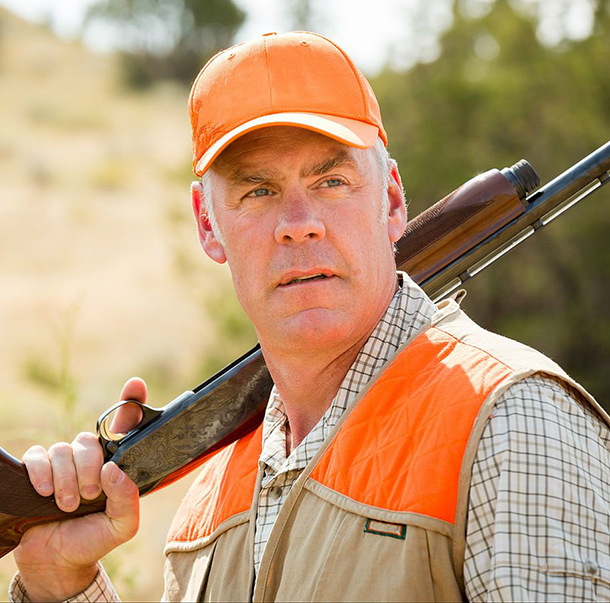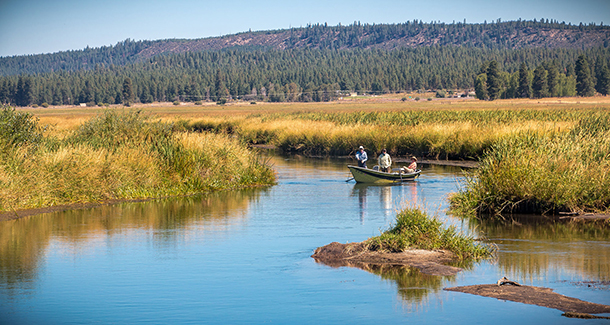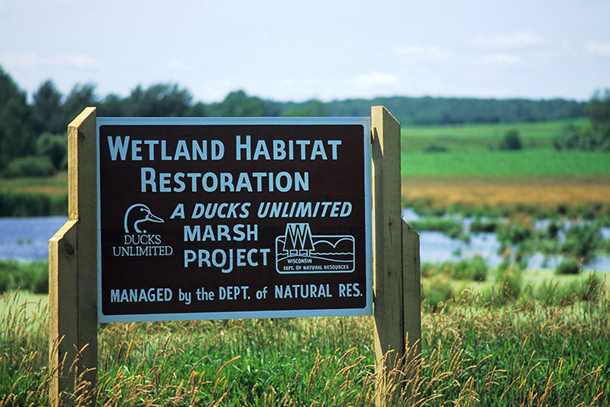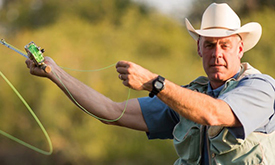Ryan Zinke, Interior Secretary, Sportsman and Conservationist
Air Date: Week of March 10, 2017

Secretary Ryan Zinke (Photo: U.S. Department of Interior, Wikimedia Commons public domain)
The new Interior Secretary, Ryan Zinke, is a keen outdoorsman who advocates multiple uses for federal public lands and keeping them in federal control, not the states. Dale Hall, CEO of Ducks Unlimited and former Director of the U.S. Fish and Wildlife Service, tells host Steve Curwood why his organization applauds Secretary Zinke’s appointment, and describes the challenges ahead for the former Navy Seal and former Congressman from Montana who’s now in charge of one in every five acres of US soil.
Transcript
CURWOOD: From PRI, and the Jennifer and Ted Stanley Studios at the University of Massachusetts Boston, this is Living on Earth. I’m Steve Curwood.
When it comes to the federal government’s stewardship of the environment there is perhaps no more important official than the Secretary of the Interior, and our newest one is former Montana Republican congressman Ryan Zinke. The former Navy Seal is now in charge of managing around a fifth of the US land area, and a wide-ranging portfolio from national parks to Native American affairs. Dale Hall is the CEO of Ducks Unlimited and served under President George W. Bush as Director of the U.S. Fish and Wildlife Service, a branch of Interior. He joins me now to discuss Secretary Zinke’s appointment.
Dale, welcome to Living on Earth.
HALL: Well, thank you for having me.
CURWOOD: So, your organization Ducks Unlimited has applauded Ryan Zinke as the choice for Secretary of the Interior. Why?
HALL: Well, we think that Mr. Zinke understands the issues that the Department of the Interior will face. Many people don't realize that the Department of the Interior oversees one in every five acres of the United States, oversees all of the mineral and the energy extraction other than hydropower and nuclear energy. But the main reason is we believe that he understands our concerns and our, by that I mean the traditional hunting and fishing community that has really paid for the conservation in this country and has been there to try and help make sure the conservation is a generation to generation legacy. So, we really believe that his background growing up in Montana, living near national parks, living on the land, will help him be a good secretary.
Secretary Zinke rode to the Interior Department building on a horse his first day in office.
Honored to stand with the brave officers of @USParkPolice - these professionals put their lives on the line for us pic.twitter.com/QbtojcfvLV
— Secretary Ryan Zinke (@SecretaryZinke) March 2, 2017
CURWOOD: It made quite an impression on us when Secretary Zinke showed up to work on his first day on the back of a horse.
HALL: [LAUGHS] Yes, that was quite an entrance. We met with him that very morning. I was one of the people that met in his office, and I think he wanted to send a message that he is tied to the land and that the people on the land and who use our public lands that belong to them, he wanted to send a message, I believe, that he's going to be a person to make sure that the public gets to use those lands.
CURWOOD: He signed a couple of orders on that very first day. Tell me about the significance of what he signed. Let's start with Order 3347. That regards wildlife habitat and access to public lands.
HALL: Well, that has several parts to it, and it re-authorizes a wildlife council that's an advisory council to the Secretary of the Interior and the Secretary of Agriculture, and it is allowing the public to have a voice and to give advice on what kinds of things are important - Access for hunting and fishing and camping and all the outdoor recreational activities -- And making sure that we have a seat at the table. That’s really important, and it also, again, sent a message that he wants the public lands to be open for use.

Secretary Ryan Zinke now oversees millions of acres where citizens get out on their public lands through hunting, fishing, hiking, and other outdoor recreation activities. (Photo: Bureau of Land Management Oregon and Washington, Flickr CC BY 2.0)
CURWOOD: Now, how do you anticipate Secretary Zinke will balance the various uses for federal public lands? I'm thinking of resource extraction, coal mining, oil and gas development, minerals extraction.
HALL: Well, in his comments, when we were together with him, he made it clear that he believes himself to be a Theodore Roosevelt conservationist. And if one looks at the history of Theodore Roosevelt, he supported creating national forests, national parks, and the National Wildlife Refuge System began under him where people could get out and enjoy them as well and have consumptive uses. So, in his words the other day, he said that while there are definitely places, and we need to protect those, where we go and take only photographs and leave only footprints, the vast majority of public lands are meant for the people to be able to have multiple uses on.
When you look at the mineral extraction that you mentioned, there are laws there that have to be followed, and if the public is entitled, after following all the rules associated with it, to able to make those extractions, then I believe the secretary will believe, the same way I do, that if the rules have been met then the law means for the people to be able to do those things.
On his first day in office, Secretary Zinke signed Orders 3346 and 3347.
Today I signed two secretarial orders to expand #hunting #fishing and #recreation on #publiclands. https://t.co/HhFBSIIETI pic.twitter.com/SddwIwzmUW
— Secretary Ryan Zinke (@SecretaryZinke) March 2, 2017
CURWOOD: And tell me about the other order that you were there to witness Secretary Zinke sign on day one. Now, this one overturns the US Fish and Wildlife Service ban on lead ammunition and fishing tackle, although of course the ban on lead shot remains in place for waterfowl hunting. Why?
HALL: Well, this whole “director’s order” was unfortunate. Having been the director of the Fish and Wildlife Service, the director has the ability to send out orders and then say, "All right, this is policy until it gets into the manual. Here's how we're going to run things that are under our responsibility." The unfortunate thing about this is, Ducks Unlimited, we're proud of the fact that we support science, and science means the scientific process, the scientific ethic. Let's vet the data that we have. Let's discuss the pros and cons, and then let's have a decision that is equal to, not greater than but equal to the science that is there, support it. This order did none of that. It was a last minute effort to try and put something out on the ground where there had been no scientific vetting. There have been no scientific discussion. So, we were really glad to see this withdrawn, and, if in the future the science does come out that justifies and supports that there should be additional bans on lead for hunting and fishing, then we're all for it. When the science was there to support a ban on lead for waterfowl hunting in 1992, we went to non-toxic shot and have been there ever since.
CURWOOD: To what extent do you think that this is an issue that is perhaps best left to the states?

Ducks Unlimited has helped restore about 14 million acres of wetlands (Photo: Wisconsin Department of Natural Resources, Flickr CC BY-ND 2.0)
HALL: I believe personally and we believe at DU that every issue that can be handled by the states should be. We had proof throughout the country, not just in one state but in states all across the country.Wwe saw lead poisoning in waterfowl. It was hard to watch, to watch a bird get sick on lead poisoning and not even be able to hold its head up and literally drop its head in the water and drown. Those were the kinds of effects we were seeing all across the country.
California condor is a wonderful example that, yes, there are lead issues there, but it's a local state issue. The condor occurs in California, Arizona and Utah, and Arizona stepped up and offered nontoxic bullets to their hunters because it was the fragments of lead in carcasses that the condors were getting in. The sinker issue in the east coast really should be addressed by the state, unless it goes out into multiple states and there is science to say that.
CURWOOD: Dale, Secretary Zinke is on the record as saying he doesn't agree with transferring federal public lands to the states. To what extent do you agree, and what do you think of his views on this?
HALL: Well, that's one of the reasons that we really like him. We completely agree with that. Federal lands truly belong to all of the people of United States. To discuss shifting federal lands to a specific state really overlooks and bypasses the rest of the owners of that land, and so we really do believe that land that is federal and public should stay in federal holding and for the public, and we support his approach to this 100 percent.
CURWOOD: What do you think his overall approach is going to be to the question of listing endangered species? Right now there is controversy over wolves in Wyoming, and the list is actually pretty long.
HALL: Well, I would hope and advocate to him, if he asks, that he simply comply with the law. The endangered species issues have gotten out of hand because of the emotional aspects on both sides of the issue.
Secretary Zinke tweeted a photo of his framed portrait of Theodore Roosevelt on prominent display in his new office:
Lola and I found Teddy at an estate sale in Indiana. He's been in all my offices since. pic.twitter.com/Fp3uQXbUgc
— Secretary Ryan Zinke (@SecretaryZinke) March 7, 2017
You mentioned wolves. I can bring polar bears. I can, well, there are about 1,300 species on the domestic list of threatened endangered species, and through my career, 30 years with the Fish and Wildlife Service, better than 400 of those species have my signature accompanying it. So, I was involved in a lot of these, and unfortunately the Endangered Species Act is an emotional act. Too many people want it for purposes other than what the law is intended to do. The purpose of the Endangered Species Act is to conserve ecosystems and the threatened and endangered species that depend on those ecosystems. The problem today is that it’s species-by-species argumentation rather than thinking about the ecosystems.
CURWOOD: By the way, since you are the CEO Ducks Unlimited, how are waterfowl doing in the US, and what are your aspirations for Secretary Zinke to improve conditions?
HALL: Well, first of all the waterfowl in the US are doing really, really well. Waterfowl surveys began in 1955 – 1955! - Flying the nesting grounds in Canada and the northern United States to make assessments of how many birds were nesting. It's been done the same way every year, same transects thousands of miles every year since then. For the last three years we have had the highest nesting counts on record, and yet we've done that with and had those counts with literally losing 70 percent of our grassland nesting habitat and significant amounts of our wetlands, and the reason we're able to do it is through the kinds of partnerships we at Ducks Unlimited work on. We go work with farmers and ranchers and other people out on the ground and have them be able to have working lands, but then, as soon as harvest is over, we flood it up and we create the habitat for the waterfowl up and down the flyway. So, what I would ask out of Secretary Zinke is to understand how important those partnerships are because regulation can only keep circumstances from getting significantly worse or for having habitat destroyed. If you're going to have improvements, the only way you can do that is through voluntary actions with the land owners that have the habitat.
CURWOOD: To what extent do you think conservation and outdoor recreation is, and can be, a nonpartisan policy space that brings people from the entire political spectrum, or at least the vast majority of it, together?
HALL: Well, I'm one of those people that is adamant that conservation is not bipartisan. It's nonpartisan. It is a value system. It is a value in the people's hearts of United States and always has been from the time the Pilgrims came here and the settlers came, they came not just for religious freedom, but they came for freedom to be able to hunt and get food and be able to live off the land. And when talking about the pursuit of life, liberty and happiness, all those things are rolled up in there, and when I go to Washington and visit members of Congress and the Senate, I go to both sides of the aisle, and we're welcomed on both sides of the aisle, and I can tell you that I no one party owns the conservation ethic. Both Democrats and Republicans have been good friends to conservation.

A 5th-generation Montanan who grew up near Glacier National Park, Secretary Zinke enjoys hunting and fishing (Photo: Scott Wilson / Department of Interior)
CURWOOD: What do you think is going to be Secretary Zinke's biggest challenge in office? What's the tough nut that he's facing that he's going to have to crack?
HALL: Oh, well, his department is so large, but I would say that the Endangered Species Act and bringing it back to where people stop fighting and start making it work the right way. Energy is certainly going to be a large challenge - How to do it the right way - Because America is still addicted to carbon and whether we like it or not we're not ready to flip the switch yet and go to solar and geothermal and all the other types of renewable resources. We're just not ready for that yet, from the grid standpoint. So I think energy and management of the public lands, which includes endangered species, will be his probably two largest challenges.
CURWOOD: Dale Hall is the CEO of Ducks Unlimited and a former director of the US Fish and Wildlife Service. Thanks so much for taking the time with us today.
HALL: Thank you for having me.
Links
Department of the Interior press release on Orders 3346 and 3347
Secretary Ryan Zinke’s open letter to Interior Dept. employees
NYTimes: “He Will Soon Run a Fifth of the Nation. Meet Ryan Zinke.”
Ducks Unlimited statement on Ryan Zinke’s confirmation as Secretary of the Interior
Living on Earth wants to hear from you!
Living on Earth
62 Calef Highway, Suite 212
Lee, NH 03861
Telephone: 617-287-4121
E-mail: comments@loe.org
Newsletter [Click here]
Donate to Living on Earth!
Living on Earth is an independent media program and relies entirely on contributions from listeners and institutions supporting public service. Please donate now to preserve an independent environmental voice.
NewsletterLiving on Earth offers a weekly delivery of the show's rundown to your mailbox. Sign up for our newsletter today!
 Sailors For The Sea: Be the change you want to sea.
Sailors For The Sea: Be the change you want to sea.
 The Grantham Foundation for the Protection of the Environment: Committed to protecting and improving the health of the global environment.
The Grantham Foundation for the Protection of the Environment: Committed to protecting and improving the health of the global environment.
 Contribute to Living on Earth and receive, as our gift to you, an archival print of one of Mark Seth Lender's extraordinary wildlife photographs. Follow the link to see Mark's current collection of photographs.
Contribute to Living on Earth and receive, as our gift to you, an archival print of one of Mark Seth Lender's extraordinary wildlife photographs. Follow the link to see Mark's current collection of photographs.
 Buy a signed copy of Mark Seth Lender's book Smeagull the Seagull & support Living on Earth
Buy a signed copy of Mark Seth Lender's book Smeagull the Seagull & support Living on Earth

